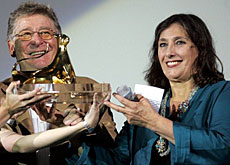Solothurn film days go musical

The annual Solothurn Film Festival opened on Monday, proposing as usual plenty of premieres, but also a trip into the world of music.
Switzerland’s biggest domestic film festival will also take a glance over the borders, looking at exchanges with France, Germany, Austria and Italy.
The biggest Swiss film showing in cinemas from this week will be Michael Steiner’s “Grounding”, a drama about the demise of former national airline Swissair.
Grounding will also be screened in Solothurn, but Steiner’s previous feature, “Mein Name ist Eugen” (My Name is Eugen), is one of the movies in competition for the annual Swiss Film Prize.
Other films in the running for the award – to be handed out in Solothurn on Wednesday – include “Snow White” by Swiss-Iraqi director Samir, “Fragile” by Laurent Nègre and “Ryna” by Ruxandra Zenide.
Oscar winner Xavier Koller will also be there with his made-for-television film “Havarie” and Richard Dindo with his documentary “Wer war Kafka?” (Who was Kafka?).
One of the biggest changes at this year’s festival is the arrival of a new section called Sounds & Stories.
“It’s an old dream of mine,” festival director Ivo Kummer told swissinfo. “I love video clips and the aesthetic that goes with them.”
The new section is targeted at a younger audience. It also highlights the traditional importance of music in films.
“Music is a bit like the soul of a film,” said Kummer, who points to recent feature films like Samir’s “Snow White”. “You can see how music videos have influenced the editing, lighting and cinematography.”
Kummer added that many young directors start with video clips. “This is how Samir began working, and now he’s been nominated for the Swiss film prize,” he said.
Language problems
Another section called Passages looks at exchanges between the Swiss film community and those in neighbouring countries. These exchanges are somewhat hampered by the language barrier, according to Kummer.
“Unfortunately, the European market for Swiss films is restricted because the dialogue is often in dialect,” he said.
On average, only two or three feature films produced in Switzerland make it over the border and into foreign cinemas each year. Despite this, the Swiss film industry has a strong presence at foreign cinema festivals.
But the language barrier is not just a problem outside Switzerland. “French-speaking Switzerland is generally impervious to German-language movies made here,” complains Kummer.
Just why this should be so remains shrouded in mystery, and Kummer hopes that research mandated by the Federal Culture Office will offer some kind of explanation.
“There are obviously cultural differences,” admits the festival director. “The French-speaking audience is more likely to turn to French-language films, especially those that are heavily promoted or with special interest.”
Schell retrospective
This year’s festival retrospective focuses on Swiss actor and director Maximilian Schell. A widely respected movie star, Schell earned himself the Oscar for best actor in 1961 for Stanley Kramer’s film “Judgement at Nuremberg”.
His films presented at the festival include “Der Richter und sein Henker” (Getting Away with Murder) and “Justiz” (Justice), based on novels by Swiss writer Friedrich Dürrenmatt, as well as “Geschichten aus dem Wienerwald” (Tales from the Vienna Woods) and the documentaries “Marlene” and “Meine Schwester Maria” (My Sister Maria).
swissinfo, Susanne Schanda
The 41st Solothurn film festival runs from January 16 to January 22.
200 new Swiss films will be presented, including 27 feature films and 45 documentaries.
The festival budget is SFr2 million ($1.6 million).
A number of major film festivals take place every year in Switzerland.
Solothurn concentrates on domestic production, while the Locarno film festival in summer is an international event.
The “Visions du Réel” documentary festival takes place in Nyon.
In Basel, the Viper festival hosts video and new media productions.

In compliance with the JTI standards
More: SWI swissinfo.ch certified by the Journalism Trust Initiative











You can find an overview of ongoing debates with our journalists here . Please join us!
If you want to start a conversation about a topic raised in this article or want to report factual errors, email us at english@swissinfo.ch.